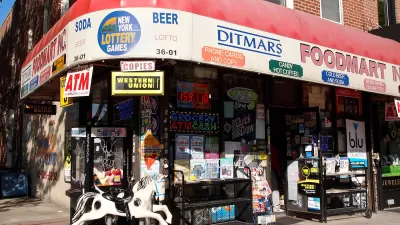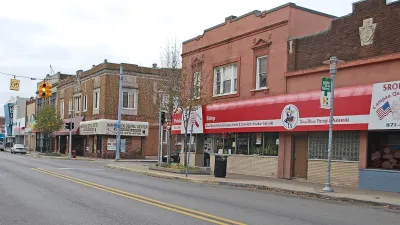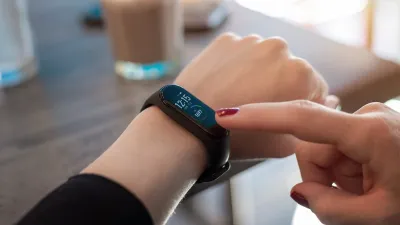Shopping for bulky items can be one of the challenges of living car free. Here are three of the best ways I've found for dealing with the problem.
I have spent about half my working life without a car- not just in New York where I now live, but in more auto-oriented cities such as Buffalo, Cleveland, Atlanta (for my first year or so there) and Jacksonville, Florida (for my first few months there). In those days, I would occasionally be asked: "But how do you deal with groceries"? In fact, I just read a newspaper column that seemed to lampoon concerns about walkability by raising the "how can you walk from the grocery store" trump card.
Admittedly, you can't carry as much in your hands as in a car- even if you save some strain on your hands by riding transit for part of the distance. But I personally have developed three ways of dealing with this problem. First, I sometimes just shop more often, and buy less food at a time. This worked best in Toronto, where there were lots and lots of grocery stores within walking distance of either my apartment or public transit. Similarly, in Queens I often employ this strategy because I love only a block and a half from a grocery store, and a few blocks from others.
Second, I have brought a suitcase or rolling cart to stuff groceries in (or alternatively, a really large trash bag). This strategy might look awkward, but seems more appropriate for longer trips when I want to buy more stuff (for example, if I am going to an unusual grocery store in another neighborhood, like Pomegranate in Brooklyn).
Third, I sometimes just buy a ton of groceries and take a taxicab home. This strategy works best in more auto-oriented cities like Jacksonville and Atlanta, where the nearest grocery is close enough for a cab ride to be relatively cheap, but far enough away that I wouldn't want to walk home with more than two or three grocery bags.*
*And to those of you who bicycle (which I don't): feel free to add your own thoughts.

Alabama: Trump Terminates Settlements for Black Communities Harmed By Raw Sewage
Trump deemed the landmark civil rights agreement “illegal DEI and environmental justice policy.”

Planetizen Federal Action Tracker
A weekly monitor of how Trump’s orders and actions are impacting planners and planning in America.

The 120 Year Old Tiny Home Villages That Sheltered San Francisco’s Earthquake Refugees
More than a century ago, San Francisco mobilized to house thousands of residents displaced by the 1906 earthquake. Could their strategy offer a model for the present?

Ken Jennings Launches Transit Web Series
The Jeopardy champ wants you to ride public transit.

BLM To Rescind Public Lands Rule
The change will downgrade conservation, once again putting federal land at risk for mining and other extractive uses.

Indy Neighborhood Group Builds Temporary Multi-Use Path
Community members, aided in part by funding from the city, repurposed a vehicle lane to create a protected bike and pedestrian path for the summer season.
Urban Design for Planners 1: Software Tools
This six-course series explores essential urban design concepts using open source software and equips planners with the tools they need to participate fully in the urban design process.
Planning for Universal Design
Learn the tools for implementing Universal Design in planning regulations.
Clanton & Associates, Inc.
Jessamine County Fiscal Court
Institute for Housing and Urban Development Studies (IHS)
City of Grandview
Harvard GSD Executive Education
Toledo-Lucas County Plan Commissions
Salt Lake City
NYU Wagner Graduate School of Public Service






























